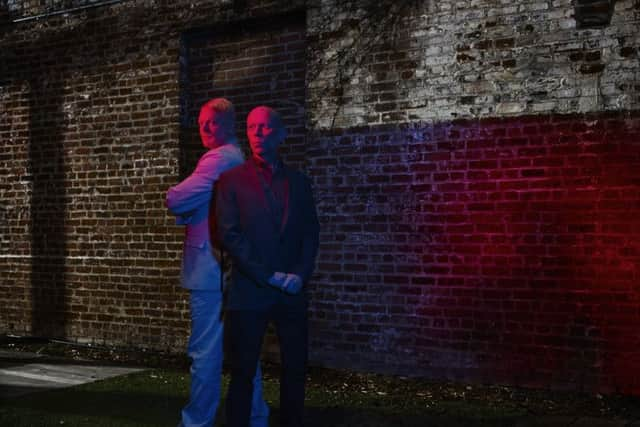Albums round up: Different Days by The Charlatans; In Symphony by Albert Hammond; Party by Aldous Harding; World Be Gone by Erasure


Paul Weller, Johnny Marr, crime writer Ian Rankin, actress and comedian Sharon Horgan, Stephen Morris and Gillian Gilbert of New Order, Kurt Wagner of Lambchop and Anton Newcombe of the Brian Jonestown Massacre all contributed to its making along with Pete Salisbury of The Verve, who took over the drum stool from the late Jon Brookes.
Guest-heavy records can often sag but in the case of Different Days it’s worked in The Charlatans’ favour, with Tim Burgess and co producing their strongest batch of songs since Tellin’ Stories all the way back in the heady days of Britpop.
Advertisement
Hide AdAdvertisement
Hide AdLead single Plastic Machinery and Not Forgotten are notably confident pieces of work, bolstered by swaggering guitar touches from Johnny Marr. Hey Sunrise is a blissful collision of guitars and electronica; Solutions sounds like a sped-up version of Air’s filter disco.


The Weller co-write Spinning Out, complete with the Modfather on piano and backing vocals, is The Charlatans at their most mellow. “Some things get better with age,” Burgess croons. Indeed the sentiment could be applied to this whole album.
Albert Hammond may have enjoyed a highly successful career writings songs for others – among them Diana Ross, Whitney Houston, Celine Dion, Leo Sayer, Julio Iglesias and The Hollies – as well as fathering the rhythm guitarist with The Strokes – but in his eighth decade even the Gibraltarian admits his new album with a symphony orchestra, the Trinity Boys Choir and London Voices seemed an unlikely release on a major label in this day and age.
“What record company would give a 72-year-old man who’s written some great songs but isn’t a huge artist in himself all this money to do this?” he asks. “My mother was right, somebody was looking out for me.”
Advertisement
Hide AdAdvertisement
Hide AdStill, it largely works. It Never Rains in California sounds rejuvenated four decades on from Hammond’s original recording; his husky tones make Don’t Turn Around sound more like a Neil Diamond number than a chart-topping smash for reggae band Aswad. The orchestration on The Air That I Breathe gives the song a stately grandeur.


And if anything can rescue Nothing’s Gonna Stop Us Now and To All The Girls I’ve Loved Before from 80s cheesiness it’s Hammond’s own, more measured versions.
If Aldous Harding’s self-titled debut alum, released on New Zealand label Flying Nun, hinted at a talent for gothic folk, Party, her new record on 4AD, shows a development not only in her songwriting but also in her willingness to push on with the arrangements and production side of things too.
Recorded in a two-week burst of creativity in Bristol with longtime PJ Harvey collaborator John Parish, the album is by turns eerie and intimate.
Advertisement
Hide AdAdvertisement
Hide AdThe title track deploys sparing bass clarinet and a vocal that recalls Joanna Newsom; I’m So Sorry is altogether more jazzy.


“I broke my neck dancing to the edge of the world, boy,” Harding laments over slow, haunting piano chords in Horizon.
In Imagining My Man, the album’s standout moment, she addresses romantic disappointment: “It’s not what I thought and not what I pictured,” she murmurs. Impressive stuff.
“Will you be my port in a storm?” enquires Andy Bell hopefully in Love You To The Sky, the curtain raiser for Erasure’s 17th studio album.
Advertisement
Hide AdAdvertisement
Hide AdThirty-two years into their musical partnership, Bell and keyboard player and songwriter Vince Clarke are in contemplative mood.


A Bitter Parting addresses the breakdown of a relationship: “With such sweet sorrow, but I guess we’ll be just fine.”
Still It’s Not Over reflects on the considerable achievements of the gay rights movement – “We made a miracle/We had to come up with a cunning plan” – but reminds us that prejudice has not been overcome everywhere.
Sweet Summer Loving celebrates the early stages of a new romance – “Baby you’re the best thing that ever happened to me”. But Oh What a World despairs at the wider state of the globe – “It’s a crazy world/A million voices go unheard/What became of wanting to be free?”
Advertisement
Hide AdAdvertisement
Hide AdLousy Sum of Nothing questions political inertia – “What do you feel now the world has lost its loving? You’re not going to criticise the injustice in the world?” But ultimately the optimist in Bell would prefer to think, in Just a Little Love, that hate can be conquered.
Amid the din of 2017 Erasure’s compassionate message deserves to be heard.